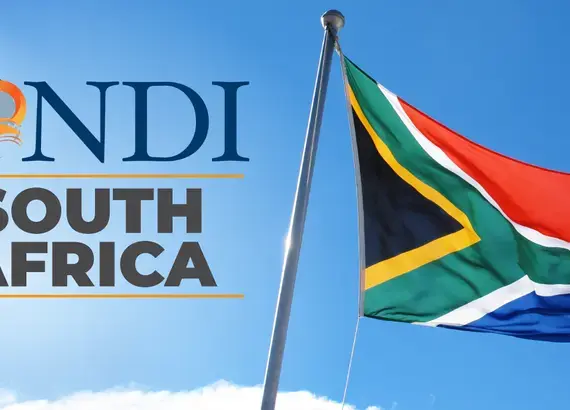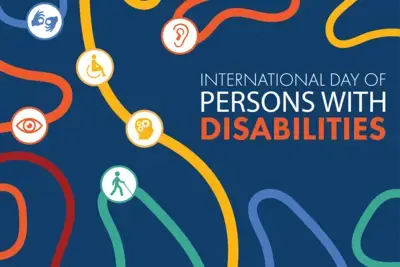
Success Story
NDI – Supporting Multiracial Democracy in Namibia and South Africa 1988-1994
Namibia’s Independence: NDI’s support for building multiracial democracy and ending the white supremacist system of apartheid started in Namibia, where South Africa, in defiance of United Nations resolutions and International Court of Justice rulings, illegally imposed its colonial apartheid administration.
In 1988, then NDI president Brian Atwood and Senior Consultant Patricia Keefer traveled to Lusaka to meet officials of the UN-founded Institute for Namibia as well as a representative of the African National Congress (ANC), which was headquartered in exile in Lusaka. Those meetings, along with consultations with UN officials, led to NDI’s efforts around Namibia’s independence, which spurred NDI’s eventual programs in South Africa. The relationships created through the programs resulted in Namibians, including current president Hage Geingob, South Africans, and former UN officials joining NDI efforts in other countries.
The United Nations Transition and Assistance Group (UNTAG) monitored an eventual ceasefire between the South West Africa People’s Organization (SWAPO) and South African forces, as well as the withdrawal and demobilization of combatants. It also oversaw voter education and registration and South Africa’s administration of the November 1989 elections for Namibia’s Constituent Assembly. That body was empowered to develop and adopt a constitution, set an independence date, and establish a government under the new constitution.
As an outgrowth of discussions with Namibians and UN officials, NDI conducted voter education efforts in partnership with the Namibia Peace Plan 435 Study and Contact Group (NPP435, a nonpartisan Namibian organization). The project involved using a number of techniques that served as a basis for NDI efforts in other countries, including major voter education programs in South Africa and Mozambique.
NDI also mobilized five fact-finding missions to Namibia to assess the electoral law and implementation of voter registration and other election processes. The missions, composed of election experts (including then NDI Senior Consultant Larry Garber), Namibia specialists and politicians from five continents, provided recommendations to the UN Special Representative for Namibia. Mission findings were shared with interested parties, and consequently the chairmen of four U.S. congressional committees jointly asked NDI to provide their committees with an assessment of the UN’s role in the electoral process. That led to NDI’s 1990 publication Nation Building: The U.N. and Namibia. These efforts established productive relationships with UN electoral offices that continue to this day.
Namibian authorities requested NDI’s assistance for its new parliament following the successful Constituent Assembly elections and independence on March 21, 1990. Expert teams dispatched by NDI included then U.S. Congressional Black Caucus staff member and now NDI Board member Donna Brazile and frequent Congressional consultant Michael “Goose” McAdams. Helping to address parliamentary organization, committee functioning, caucuses’ relationships with their party headquarters, constituent servicing, and setting up information technology (IT) systems formed a menu for NDI parliamentary strengthening assistance elsewhere.
Witnessing Namibia’s successful transition from conflict caused by foreign apartheid to an independent multiracial democracy aided NDI in other conflict-to-democracy transitions, including the transition to multiracial democracy in South Africa.
South Africa’s First Multiracial Elections: In 1991, with the forbearance of the F. W. de Klerk government, NDI established on-the-ground programming with South African partners focusing on those who were previously excluded from the political process.
Project Vote Reaches Millions. With a goal of demystifying elections for the majority of South Africans who were disenfranchised by the apartheid system, NDI and the Centre for Development Studies (CDS) of the University of Western Cape began a nationwide civic education campaign in 1991. The efforts included election “teach-ins” at 12 regional centers across the country that involved a faculty of election experts and political party and civic leaders from 12 countries. The teach-ins involved previously banned organizations and civic, church and trade union representatives. They set up mock polling stations and conducted election role-playing. For most participants, the role-play was the first time they cast a ballot.
The CDS-NDI program evolved into Project Vote, which reached millions of previously disenfranchised people. Project Vote was led by CDS’s national coordinator, Randi Erentzen and Father Michael Weeder, now the Dean of St. George’s Cathedral in Cape Town. They were joined by NDI organizers Anna Wang, Roger Berry and Carl Larkins. Project Vote conducted workshops for thousands of community-based trainers who then led voter education activities, largely in rural communities. Voter education messages were delivered in 10 languages and varied mediums to churches, schools, bus terminals, sports arenas, pension centers, hospitals, prisons, and community centers.
Electoral authorities developed the official ballot for the 1994 elections based on the sample ballot designed by Project Vote. Less than 1% of all ballots cast in 1994 were invalidated due to voter error, an exceptional accomplishment where the vast majority of people had not voted before, which was a testament to the impact of Project Vote and other efforts.
Framework Preparations for Multiracial Elections. The first major breakthrough in negotiations between governmental and anti-apartheid sectors came in the September 1991 National Peace Accord. A month later, 92 anti-apartheid organizations formed the Patriotic Front to consider approaches for negotiating a transition to multiracial democracy. From 1991-1993 the negotiations included the Convention for a Democratic South Africa (CODESA I & II) and the March to November 1993 Multi-Party Negotiation Process (MPNP) that mapped steps for the successful 1994 transition.
Beginning in 1991, NDI co-sponsored with the Community Law Center at the University of Western Cape a series of seminars on democratic election systems for organizations that would participate in negotiations with the de Klerk government. The seminars and related materials developed by NDI experts Larry Garber and Michael Stoddard helped prospective negotiators explore variations of democratic election processes and advocate for what might be best for South Africa. Between 1991-1993, in conjunction with Project Vote, NDI also sent South Africans to study democratic transition elections in 12 countries in Africa, Asia, Eastern Europe and Latin America. The Institute reversed that process by bringing several study missions from other countries that were beginning transitions to learn from South Africa’s 1994 election process. Those missions enhanced relationships among participants, which often aided dialogues upon their return, a lesson applied elsewhere by NDI.
In 1993, NDI, CDS and more than a dozen other organizations from South Africa, Great Britain and the U.S. co-hosted three conferences focused on peaceful democratic elections. Andrew Young, former UN Ambassador and NDI Board of Directors Member was a featured speaker at the initial conference. The sessions were attended by hundreds of South African political, religious and civic leaders. The UN, the Organization of African Unity and the Commonwealth Association sent representatives of their violence monitoring missions to the conferences, which helped reinforce the importance of a peaceful, credible transition. The emphasis on peace was a result of violent confrontations between the ANC and the Inkatha Freedom Party (IFP), attacks by so-called “Third Force” racist elements, and South Africa’s history of violent repression of liberation movements.
Helping Previously Excluded Parties Prepare for Elections. In 1993-94, NDI, the International Republican Institute (IRI) and the Joint Center for Political and Economic Studies (a noted Washington, DC, think tank) co-sponsored the South African Election Support Project. The project provided technical assistance to political parties that were first-time participants in South Africa’s elections. Among the parties that participated in the project were the ANC, IPF, Pan Africanist Congress (PAC), and the Azanian People’s Organization (AZAPO). AZAPO decided to boycott the 1994 elections but entered later elections.
In addition to conducting conferences and seminars with the parties, NDI and IRI each set up dedicated teams of electoral organizing specialists that held extensive consultations with them. Among NDI’s specialists were Wanda Williams, Nancy Clack, Michael “Goose” McAdams, Ed Brown, and Peter Kelly, who later joined NDI’s Board of Directors. NDI brought in U.S. experts Stanley Greenberg, Celinda Lake and Ron Lester to help the parties conduct and analyze opinion polls and communications specialists Ann Lewis and Frank Greer to discuss how to craft messages for peaceful electoral competition. The consultations also covered rights and responsibilities under South Africa’s electoral framework, codes of conduct for peaceful elections, and how to make use of party liaison, complaints and arbitration mechanisms set up by South Africa’s Independent Election Commission (IEC). The elements of NDI’s work with the South African parties provided a format for programs in countries throughout the region.
In April 1994, South Africa’s new flag was raised, successful multiracial elections were held, and a new constitution went into effect. Nelson Mandela was inaugurated as President of South Africa on May 10. Almost 20 million South Africans of all races voted in the April elections, and voter turnout was almost 89%. Most people stood in hours-long lines in a celebration of liberation and democracy that reverberated around the world and over the decades since.
In 1995, upon receiving NDI’s Democracy Award on behalf of the South African People, South Africa’s then Deputy President and later President, Thabo Mbeki, remarked: “As in Namibia, following that country’s own historic elections in 1989, [NDI] … has settled in for the long haul, realizing that where transitions to democracy are concerned, elections are the first step.”
At their request, NDI focused its post-election work with political parties on their roles in the national and nine provincial parliaments, including on standards for accountability, transparency and citizen input. NDI joined Project Vote’s efforts around the 1995 and 1996 local elections and civic education about engaging with the newly formed local governments. Project Vote was chartered in 1994 as an autonomous trust chaired by Archbishop Desmond Tutu, Nobel Peace Laureate and recipient of NDI’s 2008 Democracy Award.
At NDI’s 2008 Democracy Luncheon, Bishop Tutu remarked: “Many, many give thanks for the splendid work you [NDI] have done in emerging democracies…. You did a splendid job of work on your Project Vote. Thank you so very much.” The value of the lessons, relationships established and inspiration taken from NDI’s engagement in South Africa and Namibia far outweighed its contributions, and they continue to motivate the Institute as it looks ahead.



